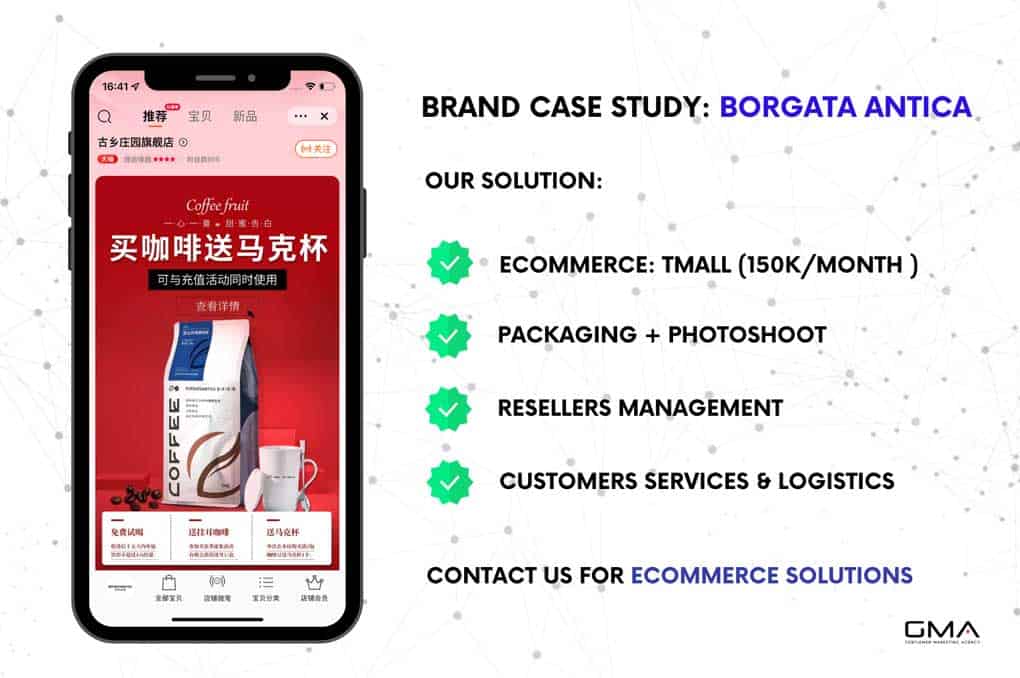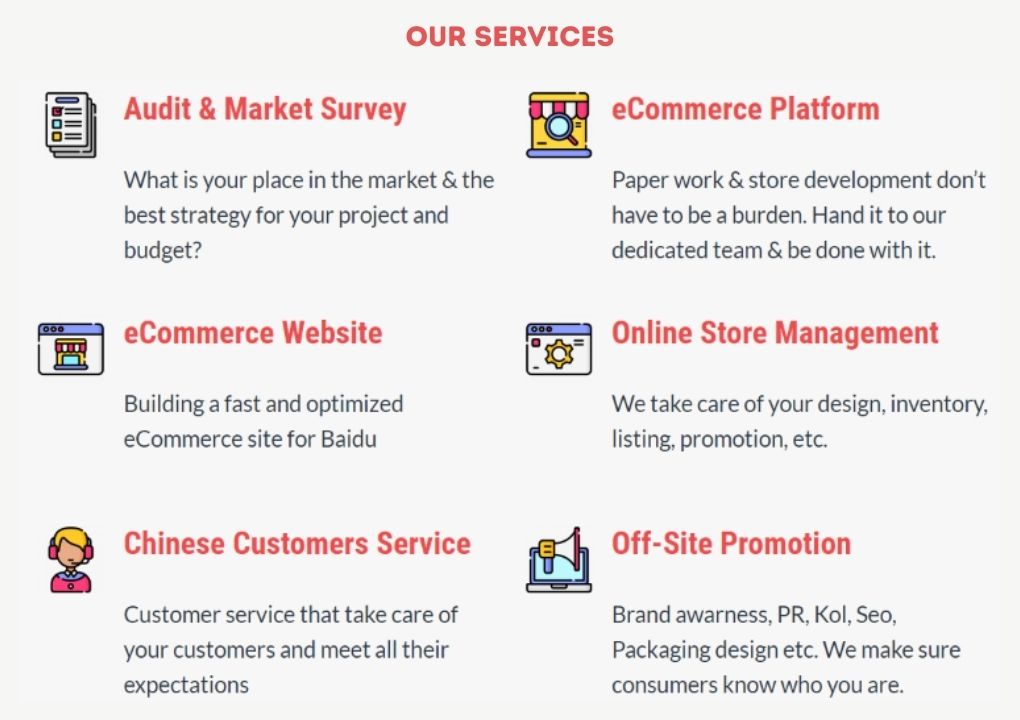Did you know that China’s economy is projected to take over that of the US by 2030? Yes, there’s a huge possibility that it will happen given that the oriental giant’s GDP is expected to grow at a rate of 5.7% per year moving forward. So, it makes a lot of sense that businesses have been trying and are still trying to penetrate the Chinese market to possibly take advantage of its growth. However, entering the Chinese market is no easy feat.
It may be a massive market that offers a ton of opportunities for brands from varying industries but the competition is brutal and we’re not exaggerating even one bit. Even if you play your cards right, it can still be very challenging. Therefore, as much as possible, you need to do everything that you can early on to evade the pitfalls that might hinder your business and your China market entry strategies.
Need a cost effective TP (Tmall Partner) to sell in China?
We are an Official Tmall Partner e-commerce Agency. Our Services: E-Commerce, Search Engine Optimization, Advertising, Weibo, WeChat, WeChat Store & PR.
How Challenging Is It To Enter the Chinese Market?
China’s massive size geographically and population-wise, with a consistently growing market, economic transformation, and a changing demographic has enticed all kinds of businesses to try their luck and set up shop in the dragon of the East.
The country is massively digitized, too, with its citizens mostly relying on the Internet for almost everything that they do and purchase. Although the lower class still has very limited purchasing power, spending has increased overall with the Chinese consumer attracted to popular brands above all else and being willing to shell out the necessary money even if it is sometimes too expensive for what they can afford.
With all of that being said, the Chinese market is complex, and contrary to popular belief it is NOT a homogenous market. Taking into consideration the political restraints that are imposed upon businesses before they can even operate and the constantly changing consumer tastes, it would be wise to do your due diligence before taking a deep dive into a high-risk and high-reward market.
Common Mistakes to Avoid in China
Still, want to break in? Make sure to avoid the mistakes outlined below.
Not Conducting Market Research
This may sound like general advice but the implications of not conducting market research before trying to sell in a market like that of China is setting yourself up for failure.
If you don’t do significant market research then you weaken your position right from the get-go. You will not have any knowledge of the market that you’re getting into and that of your target audience.

Your competition will be effective way ahead of you and you’ll be left in the dark trying to figure things out on the fly, which is never good for a business that’s only trying to enter the Chinese market.
You might as well kiss your investments goodbye. Without market research, you will not have any idea of the threats along the way as well as any opportunities for your business to grow.
Focusing on the Wrong Channels
Let’s say that you have the best product in the market. How would you successfully get your product into the hands of your target market? Well, you need to make sure that you use the right channels.
Invest in the right people, organizations, and partners to help you get your product in front of your ideal client. And, most of all, know the platforms that can help you.
The internet, social media, eCommerce platforms, and your website are your allies to get your products from point A to point B.

Promote content that resonates with your target audience and see how your popularity and relevance increase. Utilize influencers or short-form video content if your target audience is lurking around these channels.
Always adapt. If you don’t, well, let’s just say that your products will have a hard time seeing the light of day. Build your online reputation to give yourself a fighting chance. If you don’t exist on the internet, then you’re relatively invisible in the eyes of the consumers.
Assuming You Know the Culture
If you’re not a local yourself then don’t assume that you know the Chinese culture, much less the Chinese consumer. Without proper research, you’ll find yourself always wondering why your products are not flying off the shelves or worse, offending a whole lot of people.
Take note that what’s essential to the Chinese may be different from what’s essential to Westerners. What items they may pay a premium for may be different from what even the Japanese or the Koreans will look for, even if they are neighbors.
So, one cannot assume that they have knowledge of Chinese culture if they haven’t done any firsthand research on it. The best way to go about this is to actually have a physical presence in China and ideally, in its major cities to hire locals as employees.

Not Allocating Enough Marketing Budget
Another straightforward piece of advice that may just seem like a reminder from us is to make sure to allocate your budget properly. If you’ve done your research then you’ll know the things that matter most in your quest to sell your products. If you are gonna be cheap, and avoid marketing and localization costs don’t bother with the Chinese market.
One thing is for sure, you cannot neglect your digital presence using local channels, your global strategy is useless here, yes you’ll get a slight bump in reputation if you are already huge internationally but it’s often not enough – brand such as Lacoste can tell you about it. So what is the thing you gotta invest in:
- A website in Chinese Mandarin optimized to work within China’s Internet regulations should be a priority.
- Hire an SEO and content team to attract attention and rank on the Chinese search engine Baidu.
- Promote your brand/company on major Chinese social media platforms: WeChat, Weibo, Douyin, Little Red Book, and so on. You don’t have to be registered with an official account on all of them but a strong social media presence is key in China.
- Undercover marketing through Chinese Forums and Q&A such as Baidu Zhidao & Zhihu.
- Public relations: to build your brand awareness and handle crises.
- Set up shop on Chinese eCommerce platforms to get right in front of your target market. The choices are multiple. From the expensive most popular apps such as Tmall to the more affordable (Taobao/Pinduoduo) or niche (Bilibili/ Red Store) etc.
- If you must, then set up a brick-and-mortar shop. It has become more and more common for brands to launch digitally.
- Knowing who to hire for which positions is also key to your success and learning how to deal with and retain Chinese talents (The turnover rate is high in China).
Note that this advice is valid for both B2B and B2C companies. The differences will be on your choice of platform. A company selling medical equipment has no interest in being on Douyin for instance.

Not Training Your Team Members Adequately
Communication is key if you plan to make it big in China and that’s one area that you need to train your team in, especially if you have a mix of local and expatriate employees in your company. You’re going to have to be aware of the potential threat of miscommunication.
Your team has got to be creative and know how to overcome adversity on all fronts. Experience is the greatest teacher, as they say, so simulating difficult situations may be key to getting your team ready.
Not Adapting Your Strategy as Needed
If you are coming to China with your 3-year plan you may be up for some surprise. Not saying you should not have a plan with a goal, but it should be (extra) flexible. There are a few key reasons why companies need to have a flexible business plan in China.
- First and foremost, the Chinese market is constantly changing and evolving, so businesses need to be able to adapt quickly in order to stay ahead of the competition.
- Additionally, the Chinese market is considerably more complex than most other markets, so companies need to be prepared for numerous challenges and obstacles that they may encounter along the way.
- Finally, as the world’s largest economy and one of its fastest-growing markets, China offers tremendous opportunities for businesses that are able to tap into its potential. However, these opportunities come with a high degree of risk, so it’s essential that companies are able to adjust their plans as needed in order to capitalize on them.
Learn how to learn and unlearn at any given time. We can’t tell you how fast strategies may no longer work and your team has got to figure out a way to adapt to the new trends and continue to sell. It’s especially volatile in China where the population is always trying new things and with government restrictions always looming.

Why Should Businesses Explore the Chinese Market?
So, why should you explore the Chinese market? First of all, let’s be blunt and say that there is a ton of money to be made in its industry, and its economy and market will continually grow for years to come.
As much as consumers put a premium on known and popular brands, their appetite is changing as trends suggest and newer brands are constantly getting the chance to take center stage.
Wealth is also constantly spreading with the demand, as well as the growth of varying categories expected for the foreseeable future. A part of the change that’s happening is that consumers in China now tend to seek out high-quality products as opposed to knock-offs. That’s advantageous for brands that really put a premium on the quality of the products that they sell.
Also, making it in China gives you the tools to essentially make it anywhere. Yes, that quote is no longer exclusive to New York.

Work with Experts for your China Market Entry Strategies
Breaking into the Chinese market is unlike anything that you’ve probably done before. Success in the West does not in any way guarantee success for you in this country. So, be sure to do your due diligence and follow through with the tips that we’ve enumerated for you above. Research is key, knowledge is power, and creativity is your ultimate tool to make it.
No matter what industry you’re in, there’s a place for you in the Chinese market, but nothing will be handed over to you. Make sure to always keep your ideal client in mind and adapt to the ever-changing taste of the locals or end up failing.

If you need guidance or partners to help you achieve the results that you want then look no further. Contact GMA today and we’ll help you get over the hump and finally enter the Chinese market.








